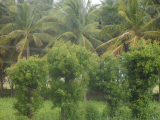
The US bombed the headquarters of the Iran-backed Iraqi Hezbollah militant group in Iraq and Syria, the Pentagon said Sunday, after a series of attacks in Iraq against
American interests.
It came after a barrage of 30 or more rockets was fired on Friday at the K1 Iraqi military base in Kirkuk, an oil-rich region north of Baghdad, killing a US civilian contractor and wounding four US service members as well as Iraqi security forces, according to the Pentagon.
Repeated mortar and rocket attacks have since late October targeted American interests in the country, where the US has 5,200 troops deployed as part of the international coalition against the Islamic State jihadist group.
The strikes against three locations in Iraq and two in Syria "will degrade KH's ability to conduct future attacks" against coalition forces, the statement added.
"KH has a strong linkage with Iran's Quds Force and has repeatedly received lethal aid and other support from Iran that it has used to attack" coalition forces, the Pentagon said, referring to the external arm of Iran's Revolutionary Guards.
An Iraqi military official told AFP that seven members of the pro-Iran Hashed al-Shaabi paramilitary group had been killed in the US attacks, including a senior commander.
The Iraqi high command meanwhile said the US strikes hit the western Anbar province which borders Syria and that 30 fighters had also been wounded.
US-Iran tensions have soared since Washington pulled out of a landmark nuclear agreement with Tehran last year and imposed crippling sanctions.
- Iraq caught in middle -
Baghdad -- which is close to both countries -- risks being caught in the middle.
In Iraq's neighbour Syria, Shiite powerhouse Iran backs the government of President Bashar al-Assad in an eight-year civil war.
Friday's attack on the K1 base in Kirkuk involved a direct hit on an ammunition depot caused secondary explosions, and four more rockets were found in their tubes in a truck at the launch point, according to a US official who spoke on condition of anonymity.
Federal security forces, Shiite militia units and IS sleeper cells all have a presence in Kirkuk province, which is claimed by both Iraq's autonomous Kurdistan Region and federal authorities.
Friday's attack and the US retaliation come as Iraq is gripped by its biggest anti-government street protests since the US-led invasion of 2003 that toppled dictator Saddam Hussein.
Protesters, many of whom grew up in the post-Saddam era, have vented their anger at a government they consider inept, corrupt and beholden to Iran.
Protest related violence has claimed about 460 lives, most of them demonstrators, and left some 25,000 people wounded, but rallies and sit-ins have continued.
Attacks against military sites in Iraq linked to the US since late October 28 have included more than a dozen rockets hitting the Qayyarah air base in northern Iraq in November.
Five rockets hit Al-Asad air base on December 3, just four days after US Vice President Mike Pence visited troops there.
A US source has said pro-Iran factions in Iraq are now considered a more significant threat to American soldiers than IS, whose sweeping offensive in 2014 saw Washington deploy thousands of troops to the country. AFP, photo by Harout Arabian from Bourj Hammoud, Lebanon.









































